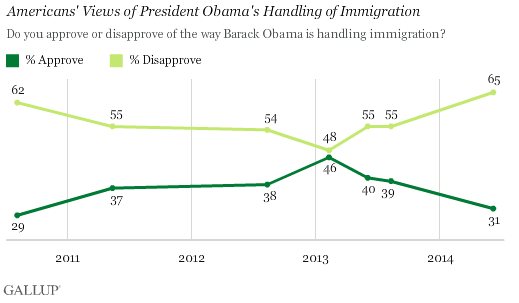
Rep. Charlie Rangel continues to lead his Democratic primary challengers. Americans are less apt to blame poverty on poor people than they used to be. And cake explainers beat pie charts. This is HuffPollster for Friday, June 20, 2014.
RANGEL LEADS PRIMARY CHALLENGERS - Siena: "Heading into the home stretch of this epic Democratic primary rematch, twenty-two-term Representative Charlie Rangel has widened his lead over State Senator Adriano Espaillat to 13 points, up from nine points last month. Rangel has the support of 47 percent of likely primary voters, compared to 34 percent for Espaillat, with Michael Walrond getting seven percent support and Yolanda Garcia garnering four percent, according to a NY1/Siena College poll of likely 13th C.D. Democratic primary voters released [Thursday]….'Two years ago, only 15 percent of registered Democrats voted. If this race sees a similarly low turnout it will likely be decided by which campaign better turns out its supporters. Espaillat has very little time to close a significant gap and the movement in the last month indicates how large a challenge that is,' Greenberg said." [Siena]
FEWER BLAME POVERTY ON THE POOR - Arthur Delaney: "Fewer Americans today blame poverty on the individual failings of poor people than they did in the 1990s, according to a new poll by NBC News and the Wall Street Journal. Forty-four percent of Americans said poverty is caused by 'people not doing enough,' compared with 60 percent in response to the same question in 1995. In the more recent survey, 46 percent said poverty resulted from 'circumstances beyond people's control,' compared with 30 percent 19 years ago….A recent poll by HuffPost and YouGov yielded similar results. Forty-nine percent of poll respondents in April said the long-term jobless were trying to find jobs but couldn't, whereas 30 percent said unemployed people could find jobs if they wanted. People who said they had experienced unemployment were more likely to sympathize." [HuffPost]
DISSATISFACTION WITH WAR AFFECTS THE PRESIDENTS WHO WAGE THEM - Gary Langer: "When President Obama says, as he did [Thursday], 'American combat troops are not going to be fighting in Iraq again,' he’s reflecting not only his own policy preferences but also a steady theme in U.S. public opinion. And as former Vice President Dick Cheney and other Bush administration officials rejoin the debate, a look back at opinions on the war seems warranted. Three key data points stand out: Steadily from late 2004 forward, a majority of Americans in ABC News/Washington Post polls saw the war in Iraq as 'not worth fighting.' That sentiment, in turn, paved the way for George W. Bush to rack up the most unpopular second term in modern polling history. And more recently, 78 percent supported Obama’s decision to withdraw all U.S. forces from Iraq in 2011 – a rare level of political agreement. The impact of an unpopular war on presidential approval is hardly news. Harry Truman’s popularity dropped during the Korean War, as did Lyndon Johnson’s during Vietnam; Bush’s merely followed suit. It’s a pattern Obama, understandably, may not wish to repeat." [ABC]
-Politifact rules Hillary Clinton's claim that Americans overwhelmingly opposed the Iraq War in 2006 is "mostly true." [Politifact]
-Andrew Dugan looks at attitudes on Iraq in the context of past polling. [Gallup]
-Reuters/Ipsos finds overwhelming opposition to new U.S. intervention in Iraq. [Reuters]
OBAMA'S IMMIGRATION NUMBERS SINK - Justin McCarthy: "Americans' approval of President Barack Obama's handling of immigration has dropped to 31%, one of the lowest readings since 2010, when Gallup began polling on his handling of the issue. Meanwhile, two in three Americans (65%) disapprove of his handling of immigration….Obama's approval on immigration has dropped since last August across all political affiliations, even among those in his own party. Democrats' approval has fallen eight points to the current 60%. Approval among independents has also fallen eight points, to 25%. A mere 8% of Republicans approve of the president's handling of the issue, and though this is not their lowest rating on the measure, their disapproval of the president's handling of immigration has reached its highest, at 90%." [Gallup]
MORE TAKEAWAYS FROM ERIC CANTOR'S LOSS - Dave Wasserman: "In truth, when an election result hits '10 on the political Richter scale' of shock value, there usually isn’t just one reason for the outcome, but lots of them acting in concert….Public disgust with Congress was a necessary prerequisite for Cantor’s defeat….Cantor’s home base wasn’t ever as comfortable with him as most people thought….When polling is sparse, one bad poll can poorly set conventional wisdom…..Effective election forecasting is necessarily a mix of art and science. In the case of Cantor’s district, there weren’t traditional quantifiable metrics or shortcuts (fundraising reports, polls or ad dollars spent) that would have suggested a Brat victory….Although I and almost everyone else failed to predict it, the Cantor earthquake does offer important reassurances. First, great shoe-leather reporting and sound polling analysis aren’t rivals; they must go hand in hand." [538]
HUFFPOLLSTER VIA EMAIL! - You can receive this daily update every weekday via email! Just click here, enter your email address, and and click "sign up." That's all there is to it (and you can unsubscribe anytime).
FRIDAY'S 'OUTLIERS' - Links to the best of news at the intersection of polling, politics and political data:
-Kathy Frankovic reviews Americans' retrospective opinions of the Clinton and Bush presidencies. [YouGov]
-Jeffrey M. Jones writes that both Clinton and Bush are among the most popular living presidents today. [Gallup]
-Christine Matthews (R) explores why "Republican pollsters seem to stumble more than Democrats." [Howey Politics]
-Harry Enten looks at the timing of past presidential hopefuls' announcements. [538]
-Alex Bellows explains how Sir Francis Galton used mathematical principles to slice a cake. [FlowingData]
